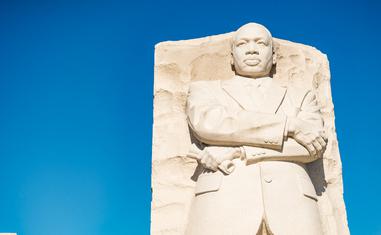The intersection of Bahá’í teachings and the teachings of Dr. Martin Luther King Jr. is profound, inviting exploration into critical societal paradigms. The pressing question arises: how does Dr. King’s vision for revolution and transition resonate with the core principles of Bahá’í belief? Is it possible that the essence of his message aligns intricately with the spiritual and social philosophies espoused by this progressive faith?
In the contemporary landscape of socio-spiritual dynamics, characterized by rapid change and uncertainty, the concept of an “Age of Transition” emerges prominently. This epoch is one marked by transformation—a period where humanity is called to evolve toward higher moral and ethical standards. The Bahá’í Faith, with its emphasis on unity and justice, provides a compelling lens through which one can view Dr. King’s dream of a more equitable society.
Dr. King articulated a vision of nonviolent resistance as a means to achieve social justice, advocating for a radical upheaval of societal norms entrenched in inequality. This notion of “true revolution” goes beyond mere political reformation; it implores individuals to engage in a spiritual revolution. The Bahá’í teachings echo this sentiment, highlighting that the advancement of civilization hinges not only on institutional reforms but also on an inner transformation of the individual. It presents a duality that necessitates both individual responsibility and collective action.
As we delve deeper into this convergence of thought, it is essential to consider the role of love as a foundational principle. Dr. King preached a powerful doctrine of love, asserting that “hate cannot drive out hate; only love can do that.” Similarly, Bahá’í teachings advocate for love as a transformative force capable of transcending boundaries. The challenge here is to operationalize love in a world riddled with animosity. What does it mean to enact love in action during a period fraught with division? How can Bahá’ís and advocates of justice alike embody this ideal amidst systemic oppression?
To navigate this revolution of love, we must heed King’s call for reconciliation and forgiveness. A genuine revolution, as posited by both thinkers, is predicated on the willingness to confront prejudices, dismantle societal barriers, and extend compassion even to those perceived as adversaries. The Bahá’í teachings encourage followers to cultivate a spirit of forbearance and to strive towards a unity that embraces differences rather than allowing them to perpetuate discord.
Moreover, the Age of Transition beckons humanity to recognize its interconnectedness. King’s advocacy for the Beloved Community—a vision of an inclusive society where justice and equity prevail—aligns seamlessly with the Bahá’í principle of oneness. The premise rests on the reality that the welfare of humanity is intertwined; hence, one’s liberation is inherently linked to the liberation of others. This concept invites a deeper reflection: how can an individual’s pursuit of happiness be reconciled with the collective pursuit of justice? What personal sacrifices might be necessary to advance this collective cause?
The Bahá’í framework emphasizes the importance of education as a catalyst for social change. In this context, one can view education as not merely an academic endeavor, but as a transformative tool that fosters compassion, understanding, and capacity for critical thought. Both King and Bahá’u’lláh, the founder of the Bahá’í Faith, recognized the role of education in uplifting individuals and communities. Can the educational models of today sufficiently address the moral decay and social injustices of our time? This question resonates as we envision a new paradigm of learning infused with ethical considerations.
Furthermore, the challenge of systemic racism and inequality which King fought against still looms large. The Bahá’í Faith offers insight into the multifaceted nature of prejudice and delineates actionable steps toward overcoming it: the cultivation of unity, respect for diversity, and the relentless pursuit of justice. However, a critical dialogue emerges regarding the efficacy of these efforts. Are the approaches presently undertaken sufficiently potent? Or is there a need for an innovative strategy—one that intertwines spirituality with a robust social justice movement?
Advocacy, a central tenant in both frameworks, calls for proactive engagement in societal issues. Dr. King emphasized that justice delayed is justice denied, thereby illuminating the imperative of timely action. The Bahá’í teachings exhort individuals to be not only passive believers but active participants in the crafting of a just society. This raises another pivotal question: how do we empower future generations to carry forth this mantle? What methodologies will ensure that the legacy of love and justice is passed down dynamically through the ages?
In conclusion, the-legged narrative of Dr. King’s vision intertwined with the principles of the Bahá’í Faith presents a challenging yet invigorating pathway toward social transformation. The Age of Transition is not merely an epoch, but a clarion call to individual souls and collective bodies alike to participate in a movement defined by love, justice, and proactive engagement. To navigate this intricate landscape requires an unwavering commitment to moral principles, a heartfelt embrace of humanity, and the agility to respond to the demands of an evolving world.
